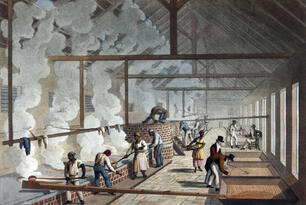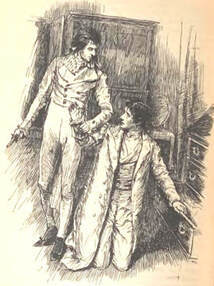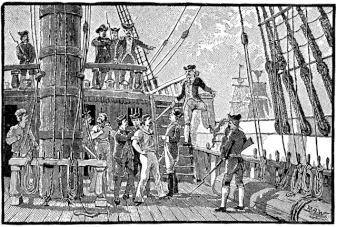CMP#43 Guilt , Misery, & Plot Devices
 Clutching My Pearls is about Jane Austen and the times she lived in. Click here for the first in the series.
Clutching My Pearls is about Jane Austen and the times she lived in. Click here for the first in the series. For the first post on this series about Mansfield Park and slavery, click here. "The students who were Jane Austen fans felt instantly complicit for liking stories where slavery might be present without an explicit critique."
-- Patricia A. Matthews, "Jane Austen and the Abolitionist Turn."
Texas Studies in Literature and Language, vol. 61 no. 4, 2019, p. 345-361
"Let Other Pens Dwell on Guilt and Misery:" Colonialism as a Plot Device In previous posts, I shared some of the non-fiction and fictional literature around slavery and abolition written in Austen's time, to demonstrate that slavery was a much-discussed and debated topic. The novels I mentioned stand in contrast to Mansfield Park for their explicit detail; in the examples I gave, the authors readily expressed their abolitionist sympathies. There were also novels in which the worst thing to be said about West Indian planters was that they were vulgar and indolent.
I now come to the most dangerous part of my thesis. There are also many examples of fictional works which referred to the West Indies, to West Indian planters, even to a slave uprising (in the case of Belinda) without editorial comment. Authors such as Maria Edgeworth and Barbara Hoflund who wrote pro-abolition fiction also wrote books in which colonial wealth, such as could be acquired in India, was simply a handy plot device.
 Boiling down the sugar syrup In an earlier post I talked about how the death of parents and guardians was often used to set up the plot in 18th century novels. These timely deaths provided the starting point for the friendless hero or heroine.
Boiling down the sugar syrup In an earlier post I talked about how the death of parents and guardians was often used to set up the plot in 18th century novels. These timely deaths provided the starting point for the friendless hero or heroine.Going to the East or West Indies to seek one's fortune is a convenient plot kickstarter. Fictional parents sometimes died on long sea voyages. For example, the father of the heroine in the popular comic opera Rosina "went to the Eastern Indies to better his fortune," but he and his wife are lost in a shipwreck. Rosina is orphaned and raised by a loyal servant.
In Whose the Dupe, a 1779 comedy, a character says his brother will "speak to Sir Jacob Jaghire to get me a commission in the East Indies: and, you know, everybody grows rich there." The Chevalier de Croustillac in A Romance of the West Indies "had dissipated his fortune, killed a man in a duel [and] had adapted the dangerous part of going to the West Indies to seek his fortune." He hoped to marry a rich widow with a plantation.
If you need to raise a character from poverty to wealth for your happy ending, the sudden acquisition of a colonial fortune is just the thing. Mrs. Davenport, The Merchant's Widow, is left in reduced circumstances with seven children after her husband's business fails and he dies. After years of privation, word arrives of an enormous inheritance from her late uncle in "Rio Janeiro" in "Peru." The actual source of the monies with which "Providence blessed" the family is not discussed; the money is presented as a fitting reward for the family's industry, filial loyalty, and piety. The Merchant's Widow came out the same year as Mansfield Park.
Likewise, in the next-to-last paragraph of Persuasion, Austen raises Mrs. Smith from poverty to comfort after Captain Wentworth untangles a problem with her late husband's property in the West Indies "with the activity and exertion of a fearless man and a determined friend."
The popular comedy The Liar (1762, but played in theatres in Austen's time) features an heiress with a huge fortune left to her by her father, "an India governor." "A governor!" exclaims the fortune-hunter. "Bushels of rupees and pecks of pagodas, I suppose."
Dr. Samuel Johnson was an ardent abolitionist, but even he uses the conveniently-acquired fortune in his 1751 essay
#153: A second son of a gentlemen, who knows he needs to work for a living, is "trifling in uncertainty" before choosing a career, when "an old adventurer, who had been once the intimate friend of my father, arrived from the Indies with a large fortune." There's not a word about how that fortune was acquired. The focus of the story is how well everyone treats the young man when they think he's the old man's heir, and how they shun him when the old man dies before altering his will.
The West Indian, (1771) another popular comedy, is not about colonialism or enslaved persons. It's about a high-spirited planter who is a bit of a rogue. It's also about timely surprise inheritances. (Though one character remarks, "girls of her sort are not to be kept waiting like negroe slaves at your sugar plantations," which presumably means "waiting" in the sense of "serving," like "wait upon you" or "waitor.")
Maria Edgeworth's 1809 tale Maneuvering concerns a scheming widow. She hopes her late husband's friend, who has returned to England from Jamaica, will leave his fortune to her family. Her schemes, not the evils of slavery, are the theme of the novel. Wealthy Mr. Palmer is presented as a kind but credulous old duffer, not as an evil slave-owner.
 Mr. Vincent, distraught over his gambling debts, is rescued by the hero If you need a romantic foil to compete for your heroine, and you want someone with a touch of sexy exoticism, a West Indian planter is a good choice. That’s Mr. Vincent in Maria Edgeworth’s Belinda (1801) who comes complete with a black servant. He doesn't succeed with our heroine, who rejects him because he's a gambler--not because he owns slaves.
Mr. Vincent, distraught over his gambling debts, is rescued by the hero If you need a romantic foil to compete for your heroine, and you want someone with a touch of sexy exoticism, a West Indian planter is a good choice. That’s Mr. Vincent in Maria Edgeworth’s Belinda (1801) who comes complete with a black servant. He doesn't succeed with our heroine, who rejects him because he's a gambler--not because he owns slaves.The nouveaux-riche planters were also sometimes portrayed as being social upstarts. In The Gipsy Countess (1799) Colonel Cary is a "nabob," that is, a man who obtained his fortune of "half a million" in India. His low-born second wife is the "rich widow of a West India planter." Author Elizabeth Gunning has much to say about his vulgarity, but apart from a passing reference to "ill-gotten wealth," little to say about how he obtained his fortune. At most you could say that Gunning's vulgar nabob and his wife are behave horribly because that's what nabobs and slaveowners do. But the focus is not on the people they enslaved and exploited. The stepmother is a villain because of the way she treats her stepdaughter, not because she's a slaveowner.
The sudden acquisition of a colonial fortune was sometimes used to raise the hero from poverty to riches. As D.N. Ghosh (2001) points out being a West Indian planter was actually more respectable than being a merchant, to Austen's contemporaries. It’s a more gentlemanly profession; it’s akin to farming. So, Savillon in Julia de Roubigné goes to the West Indies. So does Captain Sunderland in Belinda -- he needs to make a fortune so he can court the beautiful Virginia whom he has seen but never spoken to. Unbeknownst to him, while he is away, Virginia falls in love with his portrait. He returns a few years later with his friend Mr. Hartley, who--what a coincidence--turns out to be the father of Virginia.
“My dear daughter,” [says her father], “give me leave to introduce to you a friend, to whom I owe more obligations than to any man living…. This gentleman was stationed some years ago at Jamaica, and in a rebellion of the negroes on my plantation he saved my life...”
No-one asks about the fate of the negroes, or how many of them were killed during the uprising or afterwards. The entire focus is on the first meeting of the lovers, and we move straight on to the happy ending.
Finally, If you need to send one of your characters away for a long time for plot purposes, the East or West Indies are handy. Henry St. Clear, hero of The Gipsy Countess, reunites with his long-lost sister when he returns to England. Amelia Opie used the distant heir who shows up to claim his inheritance in Appearance is Against Her (1813). Elizabeth Helme's pro-abolition novel The Farmer of Inglewood Forest (1796) has two main characters who disappear for years and who then re-appear when the plot calls for them. Uncle Henry tells his niece "cheer up, my girl, I am getting rich for thee," and he sets off for India, but he disappears for more than a decade, until a remarkably coincidental meeting occurs in a jeweler's shop. Another character goes to the West Indies and marries a rich widow, returning years later to liven up the final volume with his terrible villainy.
In Sense & Sensibility, Colonel Brandon goes to the East Indies to forget his broken heart over Eliza after she is forcibly married to his brother. He returns too late to save her from disgrace and death. Unspecified financial trouble in Antigua is the excuse to get rid of Sir Thomas Bertram in Mansfield Park, but Austen's purpose in getting rid of him was to serve her plot. If the troubles in Antigua were intended to raise a plot conflict over slavery, then there should be some mention of it and some resolution of the issue in the novel. There is none.
 The impressment of sailors from American ships by the British was one of the causes of the war of 1812 So, hear me out: consider the possibility that Fanny's question about the slave-trade, asked of a slaveowner, is not as explosive as modern critics assume it to have been. It was not the equivalent of tossing an atom bomb into the narrative. Not all references to India or the West Indies were intended as stark criticisms of colonialism. There were plenty of West Indian planters and East Indian nabobs in 18th century literature and they weren't all villains.
The impressment of sailors from American ships by the British was one of the causes of the war of 1812 So, hear me out: consider the possibility that Fanny's question about the slave-trade, asked of a slaveowner, is not as explosive as modern critics assume it to have been. It was not the equivalent of tossing an atom bomb into the narrative. Not all references to India or the West Indies were intended as stark criticisms of colonialism. There were plenty of West Indian planters and East Indian nabobs in 18th century literature and they weren't all villains. Austen's use of the Bertram properties in Antigua and the "slave trade" question more closely resembles the novels I've listed above, than it does the explicitly anti-slavery stories I mentioned in the previous post.
Consider also how the "dead silence" passage serves the plot. Austen appears to have entirely prosaic reasons for the conversation between Edmund and Fanny. It reinforces dynamics which come to fruition later in the story. We learn that Fanny is rising in Sir Thomas’s estimation, and Fanny is less intimidated by him. The other young people find the evenings boring now that Sir Thomas is home. Maria and Julia can't wait to get out of there and get to Brighton and London, and Edmund is besotted with Mary Crawford; he continually, unthinkingly, wounds Fanny by talking about her.
I am not the only heretic on this issue. Critic A.J. Downie writes: “Once again, Austen’s point appears to be not about the slave trade but about the manners of Sir Thomas’s daughters.” Austen places her emphasis in the “dead silence” passage on Maria and Julia's silence, not on Sir Thomas’s answer, whatever it was. I suggest that the passing reference to the ‘slave-trade” is treated in a similar fashion to Tom Bertram's passing reference to “this business in America.” If the impressment of men into the Navy was as historically fraught for modern scholars as chattel slavery, we’d have essay after essay explaining the serious symbolic meaning behind a funny throwaway line that Tom uses to cover up the fact that he's been gossiping about Dr. Grant. Instead we have a host of critics and readers reading anti-slavery into Mansfield Park. This same scrutiny isn't brought to bear on lesser-known novels like The Merchant's Widow or The Gipsy Countess. The difference, of course, is that Mansfield Park was written by a beloved author whose work is canonical.
To repeat one more time, it is factually not the case that authors of Austen's time didn't mention slavery in their novels. In my survey, I came across only one novel in which the author herself writes disdainfully of Africans (as opposed to novels where people who are clearly intended to be bad people say or do cruel things.) The others are either neutral on the subject (the ones listed above) or are pro-abolition (discussed here). If I find more good examples, I'll add them.
 "She had to do so indirectly through metaphor and small hints... [slavery] wasn't something novels ever talked about." Nope. Wrong. To recap: Austen could have explicitly emphasized the slavery in Mansfield Park, had she chosen to, but she didn't. Scholars who insist that Mansfield Park is about slavery are relying upon hidden symbolism, not the text or the plot. In my opinion, these interpretations are (1) questionable and (2) overthrow the structure and meaning of the novel.
"She had to do so indirectly through metaphor and small hints... [slavery] wasn't something novels ever talked about." Nope. Wrong. To recap: Austen could have explicitly emphasized the slavery in Mansfield Park, had she chosen to, but she didn't. Scholars who insist that Mansfield Park is about slavery are relying upon hidden symbolism, not the text or the plot. In my opinion, these interpretations are (1) questionable and (2) overthrow the structure and meaning of the novel. My conclusions are not driven by a wish to avoid the subject of slaver, or a fear of acknowledging it. Slavery and colonialism were not "erased" from my school textbooks or from what I have read on my own. I was reading about world history and the British abolitionist movement 50 years ago. I first learned learned about slavery when my parents were active in the civil rights movement. “Every generation thinks it invented sex, and every generation is wrong,” said the American writer Robert Heinlein. In the same fashion every generation thinks it has discovered the sins of the past.
Now, if it is true that Mansfield Park is not an abolitionist document in any significant sense, where does that leave us? Can a novel about a slave-owning family still be a great novel and a literary masterpiece? Can it be a novel with profound moral lessons? It is for me, but I recognize that others may feel differently. It's still worth discussing, I think, but on another occasion.
I've talked about what I think Mansfield Park is not about. Later I'll go back to discussing what I think it is about. I'll take a break and talk about fops and fools for a change! In A Contrary Wind, my character William Gibson, a poet and admirer of Fanny Price, is pressed into the navy and ends up with the West African Squadron, helping to suppress the slave trade. Click here for more about my Mansfield Trilogy.
Published on April 25, 2021 00:00
No comments have been added yet.



